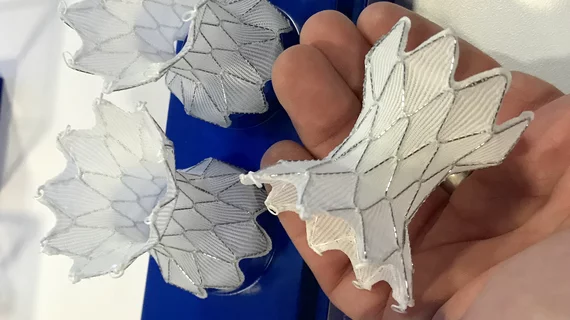Medtronic recalls Harmony transcatheter pulmonary valve's delivery catheter after multiple complaints, 1 injury
The U.S. Food and Drug Administration (FDA) announced Medtronic is recalling the delivery catheter from its Harmony transcatheter pulmonary valve (TPV) system due to a risk of part of the delivery catheter breaking off and embolizing.
The FDA has classified this as a Class I recall, meaning “use of these devices may cause serious injuries or death.” There have been six complaints and one patient injury reported so far. No patient deaths have been linked to this issue.
“Medtronic is recalling the Harmony delivery catheter because it is possible that the bond holding the capsule at the end of the delivery catheter may break during a procedure to place the TPV,” according to the FDA advisory. “A capsule bond break could cause procedure delays while the device is replaced with a new one or it may require the patient to undergo additional surgeries. Additionally, a capsule bond break while in use during a procedure could cause serious harm to the patient. Those risks include preventing blood flow and/or completely blocking (embolization or occlusion), tearing and/or splitting (perforation or dissection), or other types of damage to the patient’s blood vessels.”
This recall includes a total of 665 devices distributed from April 2021 to January 2022. Additional information on product codes and batch numbers included in the recall is available here. Customers have been asked to return all unused products and pause any new clinical trials that may involve the Harmony TPV.
“No actions are needed for patients who have already been successfully implanted with a Harmony TPV,” according to the advisory.
The transcatheter pulmonary valve gained FDA approval in 2021
The Harmony TPV received FDA approval in March 2021 to treat a leaky native or surgically repaired right ventricular outflow tract (RVOT) in pediatric and adult patients with severe pulmonary valve regurgitation.
“The Harmony TPV provides a new treatment option for adult and pediatric patients with certain types of congenital heart disease.” Bram Zuckerman, MD, director of the Office of Cardiovascular Devices in the FDA’s Center for Devices and Radiological Health, said at the time. “It offers a less-invasive treatment alternative to open-heart surgery to patients with a leaky native or surgically-repaired RVOT and may help patients improve their quality of life and return to their normal activities more quickly, thus fulfilling an unmet clinical need of many patients with congenital heart disease.”
Related Structural Heart Disease Content:
TAVR outcomes unaffected when women require a smaller valve prosthesis
Interventional cardiologists complete first heart procedure of its kind in North America
The latest data on mitral valve infective endocarditis after TAVR

